mozilla
Latest
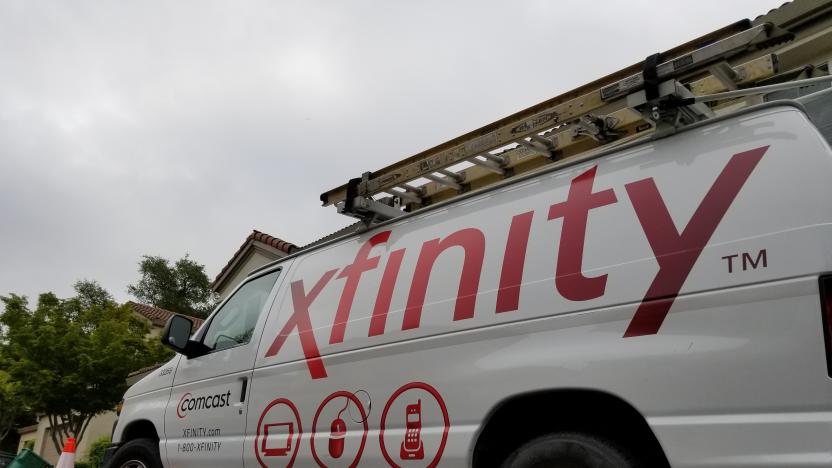
Comcast is the first ISP to join Mozilla's push for more secure browsing
Comcast is the first internet provider to join a Mozilla program that uses encrypted DNS for more secure web browsing.
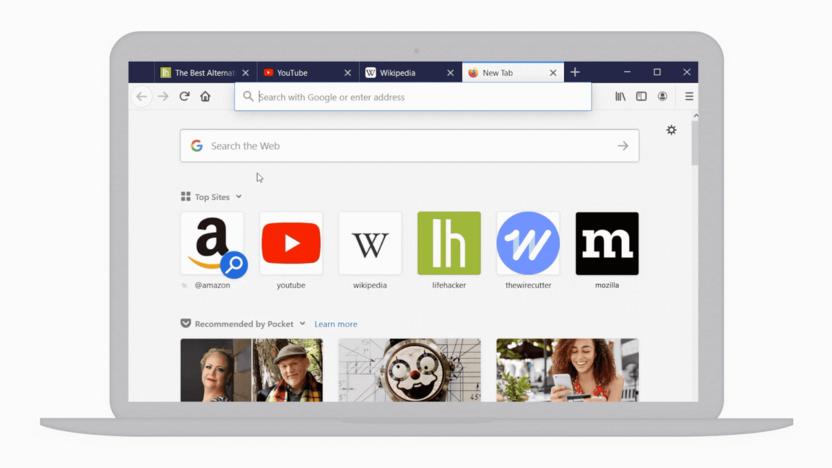
Firefox's revamped address bar is designed to make searching a lot faster
Mozilla has given Firefox’s address bar a refreshed look and a couple of updates that can make searches go faster.
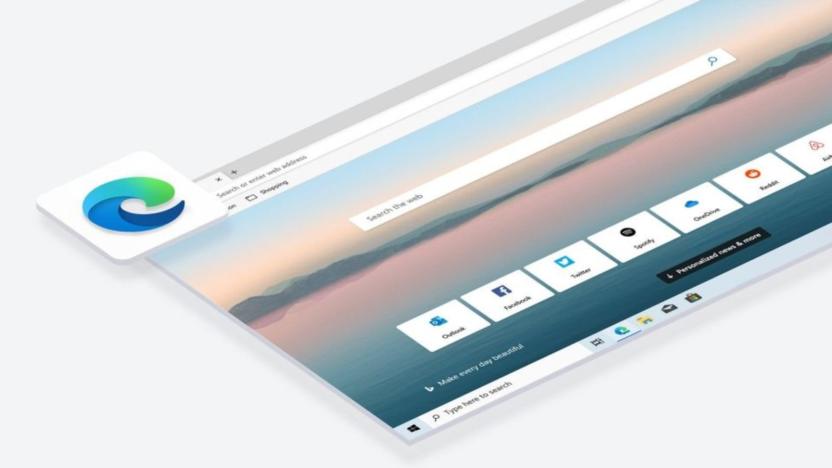
Microsoft Edge becomes the second most popular desktop web browser
Microsoft's gamble on a Chromium-based Edge browser appears to have paid off, at least in the short term. Bleeping Computer noted that Edge is now the second most popular desktop web browser based on usage, with NetMarketShare giving the software nearly 7.6 percent of the market in March, eclipsing a declining Mozilla Firefox with almost 7.2 percent. Edge is still far behind Chrome's 68.5 percent, but that's no mean feat for a browser that wasn't even three months old.
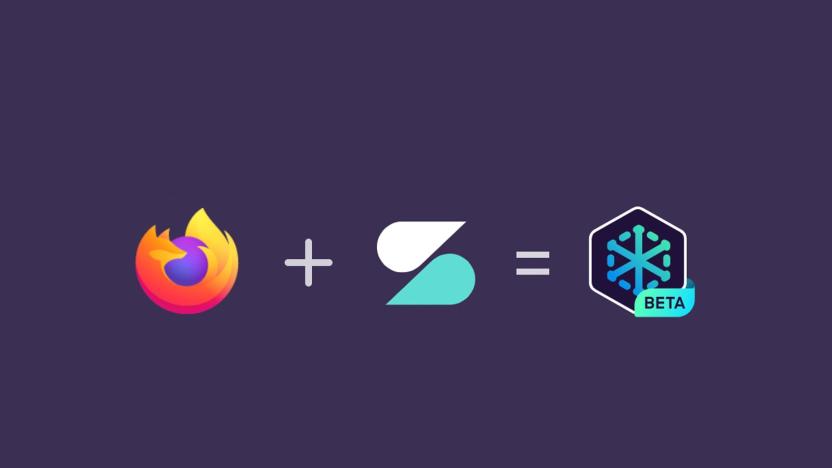
Mozilla combines tracker blocking with paid, ad-free browsing
Last year, Mozilla partnered with Scroll -- a subscription service that enables ad-free browsing of its partner publications -- to analyze if a select group of users preferred paying a small fee rather than being served ads, and if the strategy was cost-effective for the publications. After seeing promising results, the two companies have announced the Firefox Better Web with Scroll beta program. The name is a mouthful, but essentially, it combines Firefox's tracker-blocking technology with Scroll's ad-free experiences on any browser. Users can opt in and pay an introductory price of $2.49 for the service, which enables them to read publications like The Atlantic, The Onion and USA Today, add-free. The publications, meanwhile, receive a share of the revenue that Scroll makes from the subscription costs.

Firefox now encrypts domain name requests by default in the US
After a brief delay, Mozilla has started to make DNS over HTTPS the default for Firefox users in the US. Notwithstanding any additional hiccups, the company says it hopes to finish the rollout sometime over the next couple of weeks. The protocol is supposed to protect one of the most fundamental aspects of browsing the internet: translating URLs into IP addresses. Without DNS over HTTPS, bad actors can see what websites you've visited -- even if they don't know what you did on those sites thanks to HTTPS. The protocol protects your privacy by effectively disguising DNS queries as regular HTTPS traffic.

FCC forced to ask for public feedback on net neutrality repeal
Earlier this week, the FCC successfully defeated Mozilla's attempt to undo the commission's repeal of net neutrality. But, while siding with the body, judges have asked the FCC to determine if repealing the law to prevent a multi-speed internet has had any negative consequences. That includes checking if net neutrality repeal has harmed public safety, reduced spending in infrastructure or hampered the Lifeline program.

Mozilla’s latest Android app takes its VPN service beyond Firefox
Mozilla has been investigating the VPN sphere for a while. Last year it launched a VPN-like browser extension, while back in 2018 it rolled out an experimental subscription-based VPN service. Now it's launched an Android app for the full device Firefox VPN it currently has in closed beta.

Homeland Security wants you to update your Firefox browser right now
The Department of Homeland Security is urging Firefox users to update their browsers. The rare warning was issued earlier this week, after Mozilla released two critical security updates. According to the Cybersecurity and Infrastructure Security Agency (CISA), the exploit could allow hackers to "take control of an affected system."

Firefox puts an end to annoying notification requests
Firefox already has the option of blocking website notification requests, but Mozilla wants to go further by replacing them altogether. The newly available Firefox 72 replaces irksome notification pop-ups with a speech bubble that appears in the address bar. You'll still have access to notifications if you want them, but your web surfing won't come to a screeching halt when you visit a site for the first time.
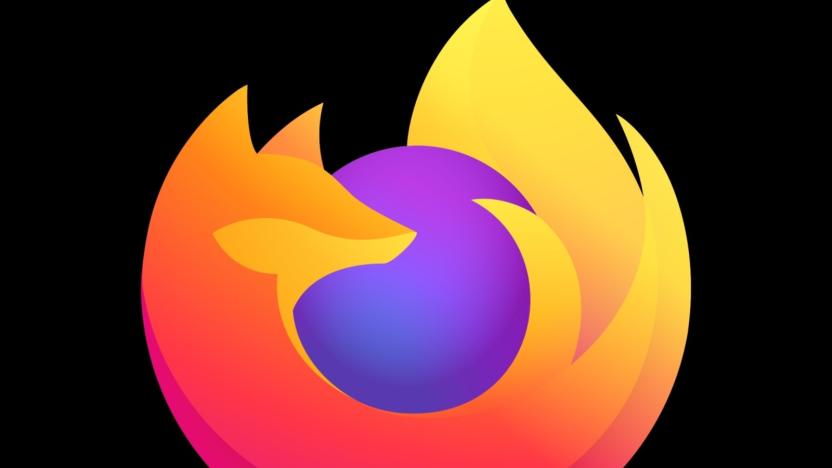
Mozilla pulls four Firefox add-ons over excessive data collection
Browser security extensions aren't automatically safer -- they might even make things worse. Mozilla has pulled Avast's Online Security and SafePrice extensions for Firefox, plus their AVG-branded equivalents, after AdBlock Plus creator Wladimir Palant found they were collecting much more data than necessary. This included a detailed web history that went well beyond site addresses and search history, including when and how long you visit a site, what you click, the number of open tabs and even when you switch to another tab. Mozilla's policies explicitly forbid this kind of fine-grained collection.

Firefox gets picture-in-picture video playback on Windows
One of the hardest things to do while multitasking is watching a video. Even if you open a clip in a new window, you often have to keep moving it around your screen so it's not blocked by all the clutter on your screen. Mozilla's new Picture-in-Picture feature for Firefox pins just about any video to your screen and prevents other tabs or windows from obscuring it.

Firefox update adds detailed tracking reports and password tools
Back in June, Firefox launched Enhanced Tracking Protection, a feature that tries to protect your privacy by blocking more than a thousand third-party trackers by default. With its latest update, which you can download today, Firefox now provides a dashboard that details exactly how the browser goes about protecting your personal information.

Russian hackers modify Chrome and Firefox to track secure web traffic
Many hackers won't touch web browsers beyond exploiting their vulnerabilities, but one group is taking things one step further. Kaspersky has detailed attempts by a Russian group, Turla, to fingerprint TLS-encrypted web traffic by modifying Chrome and Firefox. The team first infects systems with a remote access trojan and uses that to modify the browsers, starting with installing their own certificates (to intercept TLS traffic from the host) and then patching the pseudo-random number generation that negotiates TLS connections. That lets them add a fingerprint to every TLS action and passively track encrypted traffic.

Google faces scrutiny from Congress, DOJ over plans to encrypt DNS
Google's bid to encrypt domain name requests appears to be raising hackles among American officials. The Wall Street Journal has learned that the House Judiciary Committee is investigating Google's plans to implement DNS over HTTPS in Chrome, while the Justice Department has "recently received complaints" about the practice. While Google says it's pushing for adoption of the technology to prevent spying and spoofing, House investigators are worried this would give the internet giant an unfair advantage by denying access to users' data.

Mozilla's Firefox Test Pilot Program relaunches with a 'Private Network' extension
Firefox is beefing up its security features with a new beta extension that secures your personal data and hides your IP address by protecting you from third party trackers.

Firefox will encrypt web domain name requests by default
Mozilla's Firefox privacy protections will soon include one of the most basic tasks for any web browser: fielding the domain name requests that help you visit websites. The developer will make DNS over encrypted HTTPS the default for the US starting in late September, locking down more of your web browsing without requiring an explicit toggle like before. Your online habits should be that much more private and secure, with fewer chances for DNS hijacking and activity monitoring.

Firefox 69 blocks cookies and crypto-mining tracking by default
After announcing new security efforts in June, Mozilla is now rolling out the features for all Firefox users on Windows, Mac, Linux and Android. By partnering with Disconnect, Firefox will now block third-party cookies; it can also block crypto-miners from accessing users' hardware. With Firefox 69 (rolling out today), these options will be enabled by default.

Google and Mozilla to block web surveillance in Kazakhstan (updated)
Google and Mozilla are taking action against the government of Kazakhstan's efforts to launch a surveillance operation against its own citizens. Both companies announced today that they are blocking a root certificate that the Kazakhstan government unveiled last month that effectively allowed it to monitor the encrypted internet activity of any users who installed it. The nation forced ISPs to cooperate by making it mandatory for all customers to install the certificate in order to gain access to the internet.

Apple promises hostile treatment for sites that break Safari privacy rules
Apple is taking a tough new stance on websites that attempt to monitor and share individuals' browsing history. In a new policy page, published on Wednesday, the company says it will treat websites and apps that attempt to bypass Safari's anti cross-site tracking features much like it treats malware. In some instances, Apple says it will implement new anti-tracking features that target the practices of specific bad actors. Additionally, the company notes it will implement those features without offering prior notice. We've reached out to Apple for further clarification on how it plans to restrict individual websites and apps.

Firefox Reality VR web browser arrives on Oculus Quest headsets
Mozilla just expanded the reach of its Firefox Reality VR browser to one of its bigger platforms yet: the Oculus Quest. Owners of Facebook's stand-alone headset can surf sites, watch videos and dive into VR experiences through a browser that both emphasizes privacy (Enhanced Tracking Protection is turned on by default) and puts VR web activities front and center in a portal. The features will seem familiar if you've used Firefox Reality on another platform, including voice search, but that's not necessarily a bad thing if you aren't happy with the usual Quest browsing.








